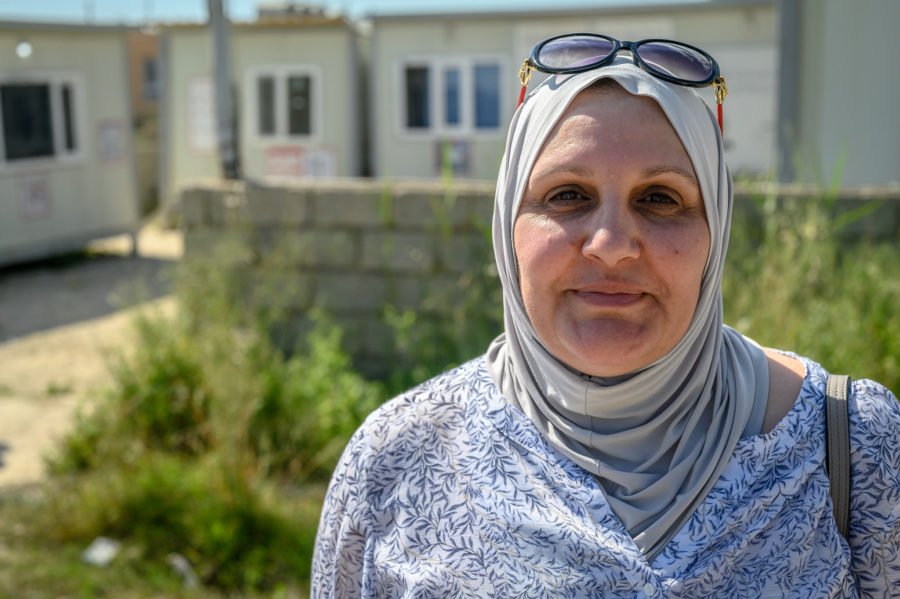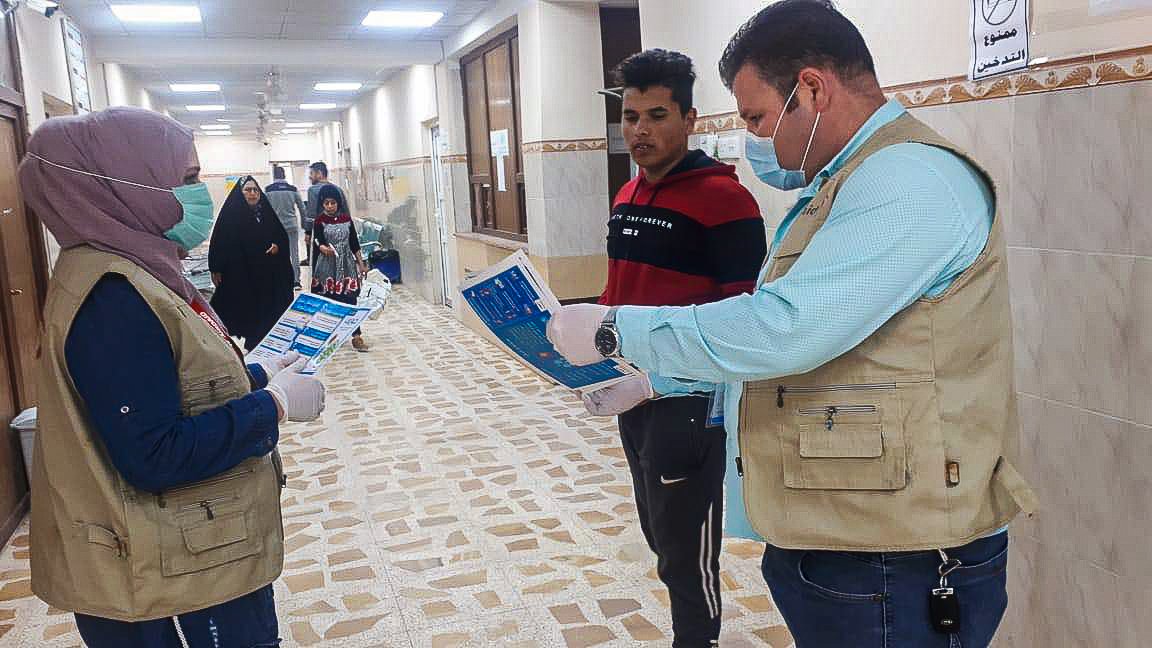“The number of calls on our GBV and domestic violence hotlines has significantly increased after confinement measures were imposed”, says Cordaid’s Hala Sabah Jameel from Iraq. With 50 other psychosocial workers, psychiatrists and health workers, she reaches out to people affected by the COVID-19 crisis.

Cordaid’s social workers and mobile team in Tal Afar, Northern Iraq.
Hala heads Cordaid’s Health team in Iraq. The past two years they have been implementing a mental health and psychosocial support programme. Cordaid works in close collaboration with existing health facilities and authorities, mainly in the Kurdistan Region and in Niniveh governorate. And recently also further south, in Baghdad and other areas.
In this ‘lockdown video’ Hala Sabah Jameel explains the impact of COVID-19 in Iraq, and how Cordaid is responding.
MOST URGENT MEDICAL NEEDS
Soon after the first COVID-19 cases were confirmed, Hala and her team launched responses to combat the virus and to address the impact of the drastic COVID-19 measures. “The most urgent needs at the moment are medical”, explains Hala, who has a medical background herself. “There’s a severe lack of medical consumables, medication, sterilizing equipment. Health workers, like everywhere in the world, lack personal protective equipment (PPE). Health authorities all over the country ask for support.”
“Our mobile teams visit people’s homes, keeping the proper distance. They explain the best ways to protect yourself in terms of hygiene. And to stay calm and composed when tensions are rising inside crowded homes.”
Cordaid is responding to these needs. “We started purchasing and distributing gloves, masks, IV fluids, nebulizers and oxygen among health facilities in the 5 governorates where we are working. And now we are also adding Water, Sanitation and Hygiene stations”, Hala continues.
STRESS LEVELS ARE RISING
But Cordaid’s response is more than medical. It also addresses the impact of the measures on people’s lives. Nationwide, there are curfews between 6 and 12 PM. All shops are closed, except essential ones like pharmacies and food stores. Governorates are completely isolated, meaning you can’t travel the country. Hala gives an overview of the mental and social effects this has on people. “People are stuck inside, in crowded homes. Men, especially daily workers, are without a job and income. Stress levels rise. Kids stay inside and have no space to play or do activities. Families are separated. Domestic violence increases, gender-based violence increases. You are only allowed to have health care in case of an emergency. Meaning regular health services have stopped and people aren’t treated. They stay at home, with their medical condition. Then there’s stigma. Both people who have COVID-19 or thought to have it, and the aid workers that reach out to them are being stigmatized. The impact is huge”, she continues.
24/7 HOTLINES FOR DOMESTIC VIOLENCE AND GBV
Both psychiatrists and social workers in Cordaid’s mental health programme, work with 24/7 hotlines for victims of domestic and gender-based violence. “The number of calls has significantly increased over the past month and a half. The hotlines keep ringing”, Hala points out. Beside the hotline counseling services, Cordaid is actively raising awareness in all health facilities, to stop the virus from spreading and to raise awareness on social and mental issues. “And our mobile teams visit people’s homes, keeping the proper distance of course. They explain the best ways to protect yourself in terms of hygiene. And to stay calm and composed when tensions are rising inside crowded homes. Soon, we will start spreading health and hygiene messages via social media. We do this in all five governorates of our programme: Erbil, Anbar, Niniveh, Salah E Din and Baghdad”, says Hala.

Hala Sabah Jameel, in pre-corona times. © Mickael Franci
WORKING OUR WAY AROUND RESTRICTIONS
Confinement measures do complicate Cordaid’s response, but work is still being implemented. “In each location, we have social workers, health staff and mobile teams. They can still move around within their areas and we follow up on them through Whatsapp, Skype, etc. The severity of curfews differs from place to place. If teams can’t move around, they stay inside the hospitals and health centres and work from there.”

COVID-19 awareness raising in a health facility in Tal Afar.
‘EVEN NOW, THEY HAVEN’T FORGOTTEN US’
Hala knows all too well that all countries in the world are going through this crisis. “Europe even more than we do”, she admits. “Yet, even now, Cordaid and the Dutch government continue to help Iraq. I am in regular contact with the Dutch Embassy. Through UNOCHA the Netherlands is supporting Iraq in dealing with this COVID-19 crisis. Even now they haven’t forgotten us”, she says.
GOOD THINGS WILL COME OUT OF THIS AS WELL
In the long run, COVID-19 is bound to deal some blows to the Iraqi economy. A further decline of the oil prices, inflation of the Dinar, loss of jobs, blows to tourism, a rise in crime rates. “But good things are coming out of this as well”, Hala claims. “More than before we see our blessings. People are quick to complain, but now we realise that we had forgotten the many good things in our lives. And being home also means being closer together with family. Look at me. In between work, I now enjoy cooking and gardening, more than I would ever have thought.”
What is the first thing she will do, once this crisis is over? She waits for a few seconds, and then, with a big smile, comes the answer. “I will go to the office. And I want to see my daughter. She is stuck in Baghdad and I haven’t met her for weeks now.”
This story was published by Cordaid





